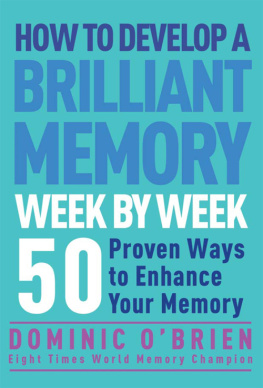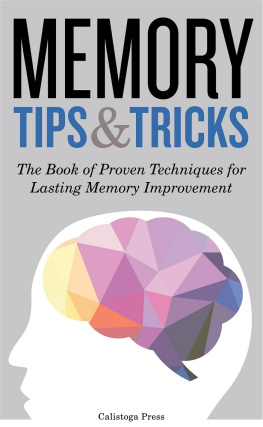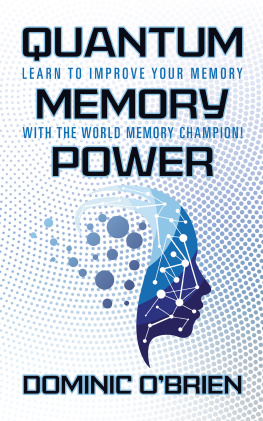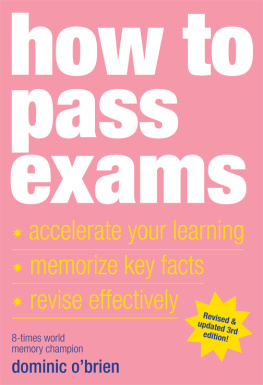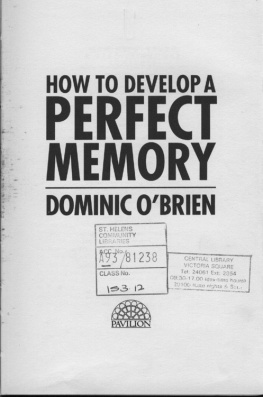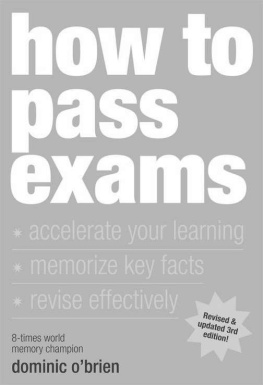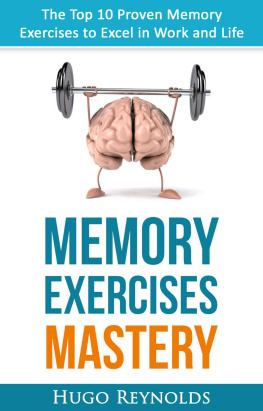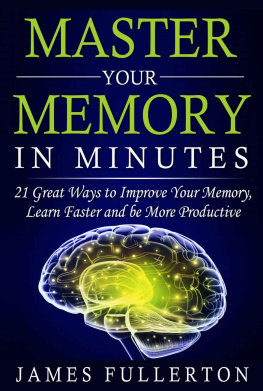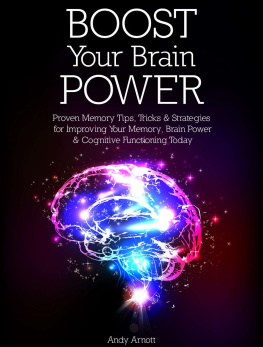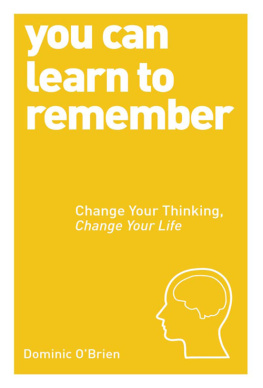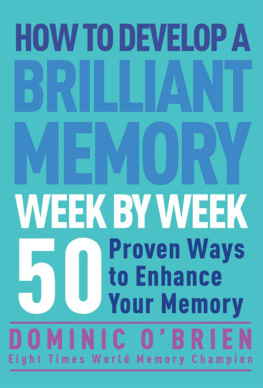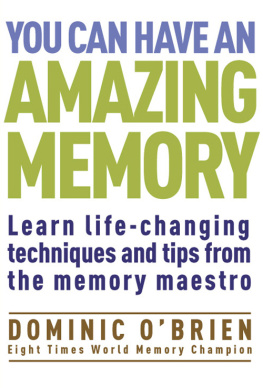Contents
Contact the Author
If you would like to contact Dominic OBrien, he can be reached through the following web address:
www.peakperformancetraining.org
Authors Acknowledgments
I wish to thank the creative team at Duncan Baird Publishers, including Bob Saxton, Justin Ford, Naomi Waters and Zo Stone, for producing this book.
Introduction
I have come to believe that many, if not most, of us have the potential to become memory champions. Having trained members of the public through game shows and lectures, as well as in impromptu meetings (for example, in restaurants), I always find that people are amazed by the way in which their memory power appears to be instantly transformed. All they have done to achieve this is implement the basic principles outlined in this book.
How to Develop a Brilliant Memory Week By Week aims to unleash the power of your memory by showing you these simple techniques in bite-sized chapters. You are never too young nor too old to acquire these skills. If you are new to memory training, then I have no doubt that you, too, will be amazed at how easily you can learn these methods and how quickly you can employ them.
To get the most out of this book I recommend that you perform the exercises and tests, which are contained in most steps. You will require a notebook for writing down your answers and for keeping a note of your scores.
The scores fall within three categories: Untrained, Improver and Master. Adding up your score for an exercise will tell you which level you have achieved. In each case, the scoring bands reflect the relative difficulty of the individual exercise. The Untrained score indicates the points I would expect someone to attain without using any memory techniques. The Improver score is the category you are aiming for; and the Master score shows a truly outstanding result. Within this scoring system, you can see how well you are doing compared to someone with an average untrained memory, and how much your own memory is improving from one step to the next. Dont worry if you score poorly to begin with or if you find certain exercises more difficult than others some of them are designed to be quite tricky! You can repeat the exercises and tests as many times as you like: memory is a faculty that is always improved by practice. The exercises and tests will not just enable you to memorize particular types of information, but will also sharpen your memory in general.
you will develop these basic principles for use in a wide range of practical applications, such as How to Remember Names and Faces, and Speeches.
will develop your memory power to a more advanced level. You will be combining many of the techniques already acquired in order to memorize more complex sets of information.
By .
Take as much time as you need to complete each step. I hope you will find my methods challenging as well as fun to learn.
Memory depends on three basic processes: making something memorable, storing that item in the mind, and recalling it accurately at some future time. Before you can begin to improve your memory you must have faith in it as a perfectible faculty. We may speak of having a memory like a sieve yet this is not in the same order of reality as being balding, or colour-blind, or pigeon-toed. As you begin to use the memory techniques in this chapter, you will find that your ability to recall facts, numbers, objects, events, places and people gradually sharpens.
This chapter begins with some word, shape and number tests to help you to evaluate your current memory power. You will learn some basic stand-alone techniques, such as Acronyms and the Body System, that are useful for memorizing small and simple sets of information.
Then we look at developing the key skills of association, location and imagination. I will introduce you to effective memory techniques including the Journey Method, a filing system for storing items you wish to remember, and the Number-Shape System, a way to recall a sequence of numbers from four-digit PINs to historical dates. I will guide you as you learn these methods and practise them in the various exercises.
How Good is Your Memory?
Whether you feel your memory is unreliable or performing reasonably well, the chances are that it is already in fairly good shape. But it is likely that no one has shown you how to access its true potential. Self-doubt may have crept in as you become conscious of forgetting peoples names, where you left your wallet, or that new PIN for your credit card.
This first step will measure how good or indifferent your current memory power is through several tests. Write down your answers and keep track of your scores in your notebook.
Dont worry if you score poorly at first, as I am confident you will make rapid progress after just the first few steps of your 52-step journey to a perfect memory.
TEST 1: Words
Allow yourself three minutes to study the following list of 20 words. Write down as many words as you can recall. The order is not important. Score one point for each word you can recall correctly, then move on to the next test.
TREE TIME FACE PIPE
CLOCK MOUSE ENGINE PLANET
THUNDER NECKLACE WARDROBE CATERPILLAR
GARDEN TREACLE PICTURE HARNESS
SLEEP APPLE OCEAN BOOK
TEST 2: Number Sequence
Study the following sequence of 20 digits for three minutes. In this test the order is important. In your notebook write down as many numbers in the correct sequence as you can before a mistake is made. Score one point for each correct digit. This is sudden death: in other words, if you recall all 20 digits but the fifth digit is incorrect, your score is four. Good luck!
5 0 3 6 7 4 4 0 9 2 8 2 0 5 7 6 7 1 2 9
TEST 3: Shapes
Take three minutes to look at the following sequence of 10 shapes. Memorize them in the running order shown below, from 1 to 10. Then turn the page where you will find the shapes reproduced in a different sequence. Follow the instructions you find there to complete the test.
Below you will see the same shapes you have just memorized, but in a different order. Try to number them in their original order (that is, as shown on the previous page, but without referring to that page). Score one point for each correctly numbered shape.
TEST 4: Binary Numbers
Allow yourself three minutes to memorize the following sequence of 30 binary numbers, then in your notebook try to write down as many of these numbers as you can before a mistake is made. Score one point for each correctly remembered binary number. Again, this is sudden death: if you recall the first five digits correctly, then make a mistake on the sixth digit, your score is five.
1 1 0 0 0 0 0 1 1 0 1 1 1 0 1 1 0 0 1 1 0 1 0 1 0 1 0 0 1 1
TEST 5: Playing Cards
Take three minutes to study the following 10 playing cards, then try to repeat the exact sequence in your notebook. As with the numbers, this is sudden death. Score one point for each card you can recall before a mistake is made.





